We have provided below a list of standard precautions in a nursing home to prevent spread of Covid-19. We hope this list will be beneficial for all visitors, staff and patients
Contents
The covid-19 pandemic has changed our lives forever. Since its beginning, in the year 2019, it has engulfed millions of people across the globe. If stats are to be believed, by January 2022 over 5.6 million people had died due to this deadly virus.
Elders who had an excellent immune response practiced proper preventive measures and were timely admitted to a nursing home have overcome the infection. Health care providers take proper care of the patients in the nursing homes and ensure their fast and comfortable recovery.
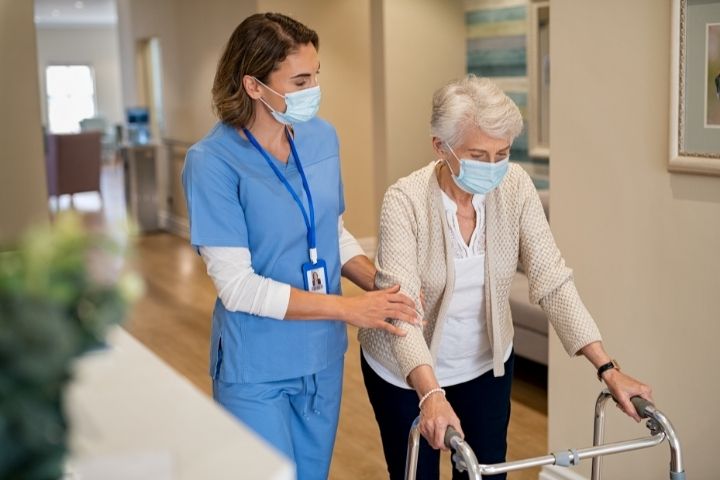
In this article, you will come across all the standard precautions taken in a nursing home to prevent spread of Covid-19 infection amongst their staff and patients. So stay tuned.
Preparations, Notification, And Early Identification For The Nursing Home
The Healthcare team and all the nurses must be protected properly to provide care for the communities and individuals they serve. It is compulsory to educate all the staff and develop preparedness plans.
It is essential to provide infection control procedures protocols used in the Nursing Home for the early identification, containment, and caring for the patients who develop symptoms of Covid 19 to prevent the spread of the disease.
- The nursing homes should develop Ambulatory, inpatient, home care policies and procedures that follow the current CDC guidelines for covid-19.
- Try to obtain an updated inventory of all the resources for providing good services to the patients. It includes space equipment, PPE, and staffing resources.
- Try to provide updated training and guidelines on using PPE and infection control measures. It is helpful to prevent the spread of coronavirus within the facility and amongst the patients and staff.
- Try to provide training to all the personnel on the transport procedures used. Make sure you provide isolation and screening instructions. Make sure you display a clear signal with instructions for PPE use.
- It should be accessible for the staff members and understand that there is the consistent use of standard precautions, contact precautions, airborne precautions, and proper hand hygiene.
- You need to display clear signage for patients. The list should consist of different symptoms of coronavirus and instructions on wearing a face mask before entering the healthcare facility.
- Before addressing presymptomatic and asymptomatic transmission, try to ensure that patients visitors entering the healthcare facility wear a cloth face mask regardless of the symptoms they develop. This prevents the transmission of the Covid-19 infection to other patients.
- The cloth face coverings are not considered as PPE, and it doesn’t replace PPE for the Healthcare personnel. All the staff members must have access to the proper PPE for their safety.
- The nursing home should create a designated point for the entry of the patients. Try to eliminate visiting hours from the hospital to prevent exposure for hospitalized patients.
- The nursing homes should provide identification in advance for the rooms designated for the quarantine and screening. Try to incorporate assessment questions to document all the detailed exposure histories.
- Try to plan out for a patient surge. Try to identify a unit where you can ask patients to stay who have confirmed with positive covid-19 test reports.
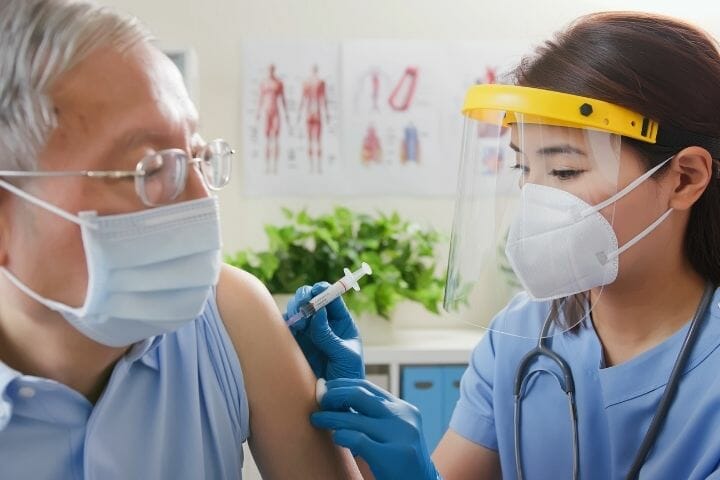
What Are The Standard Precautions In A Nursing Home To Prevent The Spread Of Covid-19?
The staff and health care members need to take care of themselves to prevent infection amongst the nursing home staff. One or more individuals should be assigned training in infection control to provide onsite management. Let’s have a glance at the preventive measures taken in a nursing home to treat covid patients.
General measures:
Various general measures are implemented to reduce the spread of the covid-19 in the nursing house. This consists of vaccination of residents and staff, certain visitor restrictions, ensuring that everybody is wearing a mask, symptom screening, and regular testing of both residents and the health care personnel.
It is essential that everybody follows these general measures since asymptomatic and presymptomatic transmission can occur. Symptoms screening alone cannot detect all cases of coronavirus. As per the guidelines issued by the CDC, each person in the staff should go to the general measures to prevent infection and control the training to provide onsite management.

Avoiding the usage of public places:
To reduce the risk of Covid infection, nursing homes have discontinued the use of common dining areas, restricting patient movement within the facility, canceling all the group activities in the nursing home, and eliminating the use of volunteers and other non-significant vendors.
Visitors restrictions:
During this pandemic, nursing homes restrict visitors from entering the Healthcare setting. In the initial stages, it was limited; however, institutions started to reduce the restrictions over the period. There were limited distance outdoor visits in the nursing house.
Even loved ones, residents, families were not allowed in the nursing homes as it could increase the risk and chance of infection amongst the patients.
The nursing homes have relaxed the restrictions on indoor visitation of the family members and the loved ones who are fully vaccinated unless the resident is recovering from the covid-19. There can be some extra restrictions when an outbreak is detected in the nursing home.
When the visitation is allowed, certain precautions are to be taken regardless of visitor or resident vaccination status to prevent any health problem. Here are a few points to be kept in mind while visiting loved ones.
- Visitors should wear a well-fitting face mask. Residents can also wear face masks if they do not have any breathing problems.
- Visitors are not allowed to enter the nursing home if they were diagnosed with covid-19 before ten days or have any symptoms of covid-19 fever. They are not allowed to enter the nursing home if they have had prolonged close contact with the infected person, i.e., within 6 feet of an infected person for 15 minutes or more than 24 hours.
- During the visits, the visitors should physically distance themselves from other residents and health care providers in the nursing homes. For the residents who share a room, family members and loved ones should be conducted outside of the room whenever possible.
- Visitors should compulsorily inform the nursing staff if they have developed any symptoms or if they were diagnosed with a covid-19 infection within 14 days of visiting the nursing home.

The proper use of masks:
Proper masking aims to reduce the spread of coronavirus from unsuspected virus carriers. All the visitors who visit the nursing homes, residents, and healthcare providers should wear masks when they are present in the Nursing Home setting. All masks should fit appropriately over the face without any gap. The Mask of respirators consisting of exhalation valves or vents is not considered sufficient for source control.
- Visitors: All visitors must bring a mask or be given a well-fitting mask when they enter the nursing home facility.
- Residents: If it is possible for the residents, they should wear a well-fitting mask when living in their room or when they are within 6 feet of contact with another individual.
- This can become challenging in the dementia unit as it becomes difficult for the patients to wear masks and maintain a social distance because of their poor cognitive capacity.
- When such patients cannot wear masks, the use of enhanced infection control precautions like eye and face protection by Health Care personnel provides them extra protection. It is essential to follow these steps even when interacting with those who are not having any covid-19 symptoms.
- Health care personnel: Healthcare personnel should also wear a well-fitting mask all the time while they are in the nursing home to reduce the spread of coronavirus from asymptomatic staff to patients and co-workers.
- A surgical mask or a respirator should be used when Health Care personnel take care of the patients. If the respirator consists of a vent or exhalation valve, then they should wear an extra layer of the medical Mask since this type of respirator is not sufficient for controlling the spread of coronavirus.
- When the supplies are limited, cloth masks can be reasonable when they enter the patient room or are involved in any direct patient care activities.
Vaccination:
- Indication: The staff and residents of the long-term care facilities, including the people who had a prior covid-19 infection, should be vaccinated against coronavirus unless there is a contraindication of this vaccine. Contraindication means different allergy conditions due to the vaccines and their components. This is essential to prevent any transmission through the asymptomatic carriers of the coronavirus.
- Considerations after the vaccination: After receiving the vaccination, the residents may experience some side effects like myalgia, arthralgia, fatigue, fever, chills, headache. This can be similar to any clinical feature of the coronavirus. CDC has come up with guidance that helps providers when this kind of situation occurs.
- Certain signs and symptoms are consistent with infection rather than the vaccination of the coronavirus. These signs and symptoms include shortness of breath, loss of taste or smell, and cough.
- If these symptoms are present, the staff should test the patient for any coronavirus infection symptoms. Clinicians should use the prevention control precautions for those with the suspected covid-19 pending the evaluation.
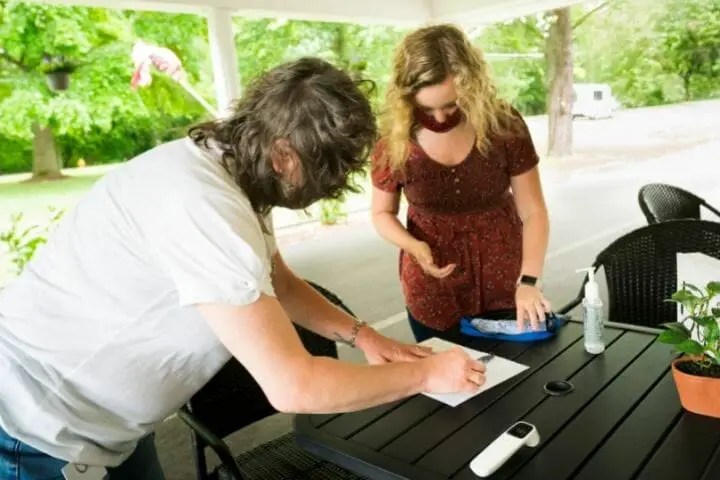
For the patients who have developed clinical findings due to vaccination or infection:
- Patients should not enter the room, and the providers should use the PPE kit to care for a patient suspected of the covid-19. With the help of the PPE kit, healthcare providers can take all the necessary precautions to prevent the spread of covid-19.
- Testing of the resident should be done if the resident is in a facility with active transmission. The testing should be performed even if the resident was in touch with someone who has developed covid-19 in the last 14 days or has developed any symptom that has lasted for the last two days.
- If the symptoms get cured within that 48 hours, the patient has been afebrile for at least one day, and the testing reports are negative, then the isolation precautions can be stopped, and the standard PPE kit can be used.
Efficacy:
Various reports recommend that vaccination is contributing to decreasing the risk of coronavirus in nursing homes. After the comparison of nursing homes on the vaccination status, there has been a greater reduction in the cases among the staff members and the residents of the nursing home that has administered the first dose of vaccine. It is essential to take all the standard precautions as vaccination a loan appears to be insufficient to prevent coronavirus infection in the nursing home completely.
Routine screening and testing:
General approach:
The CDC and WHO have suggested that nursing homes should understand a strategy of symptoms screening and viral testing to identify the outbreak of the virus. If they have less access to accurate viral testing, then Universal testing should include facilities with a known infection in two or more residents, health care personnel, and facilities in communities with a high prevalence of coronavirus infection.
Identifying coronavirus cases in the initial stages is essential in long-term care facilities as the spread of infection is associated with a high mortality rate.

Residents:
The residents in the nursing home should be screened at a particular interval of time for the symptoms of coronavirus. They should be checked if they have any vital signs, including oxygen saturation. These screenings should be done daily, and frequent monitoring can reduce the outbreak.
Since older adults do not show any typical symptoms like respiratory system problems, fever, loss of smell, a temperature below hundred degrees Fahrenheit is considered to be a symptom, and various symptoms like dizziness, diarrhea, prompt isolation worsening, malaise can be used for the detection of covid-19.
For residents who leave the facility in less than a period of 24 hours (for example, when they visit family friends, or any medical appointment) quarantining or routine testing is not usually recommended for them as long as they have not had close contact with someone who suffers from Coronavirus infection.
Healthcare personnel:
All the health care professionals, including nurse practitioners, physicians, Assistant consultants, administrators, contractors, physicians, and vendors, should be screened for the symptoms and if they show any signs. The temperature should be taken as they enter the building.
The people who have a temperature more than 100 degrees Fahrenheit should not be allowed to enter the Nursing Home, and they should be checked out if they suffer from a covid infection. Routine viral testing is essential in asymptomatic Healthcare providers who are not vaccinated. Symptoms screening is also necessary for them.
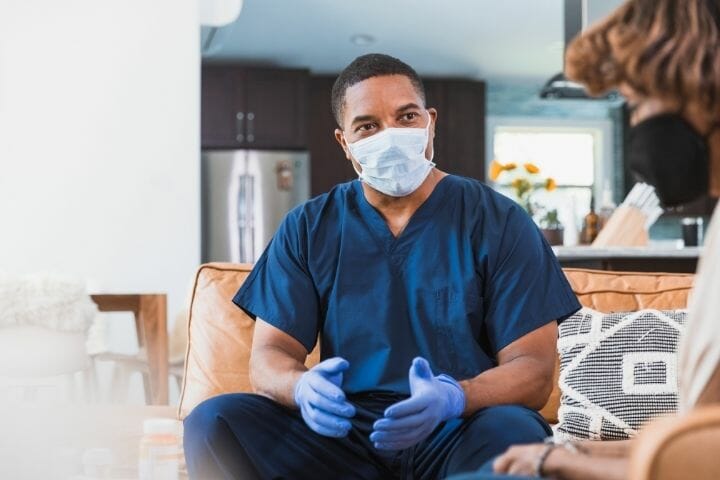
Initial management:
The following ways should be practiced with the symptomatic residents and healthcare workers regardless of whether they are vaccinated.
- Symptomatic residents and the HCP:
Symptomatic residents should not be allowed to go out of their room, and all the necessary infection control precautions required for the care of the covid-19 patients should be used.
- Asymptomatic residents and HCP:
Contact tracing should be performed to identify if the residents who had close contact with the patient and healthcare personnel. It can prevent the transmission of coronavirus through asymptomatic residents. Viral testing can also be done in residents who had contact with the healthcare personnel.
Testing needs to be done as early as possible. The health care personnel who care for this resident should use infection control precautions to take care of themselves. The tested positive patients should be taken for the evaluation of post-exposure prophylaxis.
What To Do If Healthcare Practitioner Practices At Multiple Facilities?
Some Health Care practitioners work in multiple Healthcare facilities. This enhances the risk of transmission of coronavirus. Ideally, it is believed that Healthcare professionals who work at multiple places should limit their work to a single facility on a particular day.
If they practice at two facilities, they should practice hand hygiene principles. They can wash their face and change clothes between different shifts. They need to take repeated virologic testing to prevent covid-19 transmission.
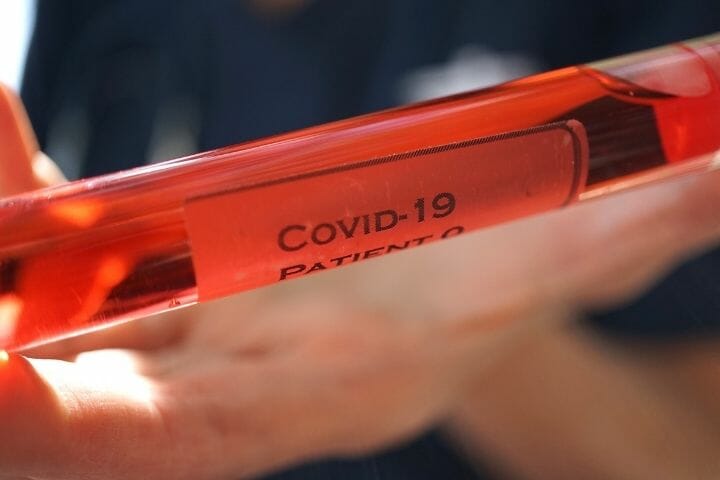
Is It Essential For Healthcare Practitioners To Get Tested Regularly?
Many times Health Care practitioners suffer from a covid-19 infection. Thus they need to test themselves on a repeated basis. This can prevent coronavirus transmission to the people who have come in contact with health care practitioners.
A nursing home is an excellent way to care for the covid-19 patients. Nursing homes can help people cure properly, preventing spreading the infection to other individuals.
You might like to read: 7 Things To Take Care Before Moving Your Parent To A Nursing Home
Final Words
The coronavirus outbreak can be prevented by taking proper precautions and taking care of it. Various standard precautions are being practiced in the nursing home to prevent coronavirus transmission to other people.
You will come across all the standard precautions practiced in the nursing home to take care of the residents. In this segment, you will come across all the significant standard practices practiced in the Nursing home. Make sure that you go through it.
We hope that the article’s content was helpful for you, and if you think anyone else should read this piece of information, then don’t hesitate to share it with them. Please feel free to write to us if you have anything more to contribute. We will try to include all your suggestions in this article if possible.
